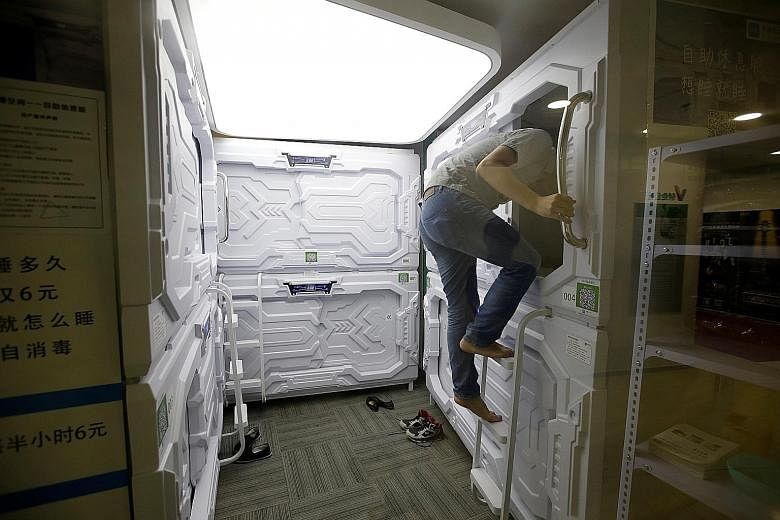BEIJING • Shared capsule beds for napping, the latest novelty in China's sharing economy, have been temporarily shut down over safety concerns, just over one month after their launch.
According to Beijing police, a total of 16 napping pods in the city's office buildings have suspended operations after it surfaced that "the capsules may become a shelter for criminals because users don't need to check in with their ID cards".
In addition, the confined space may pose a fire risk, they said.
The service, which targeted sleep-deprived workers in busy Chinese cities, was also suspended in Shanghai and Chengdu.
Shanghai police told Xinhua that the napping pods functioned like a hotel but did not secure the relevant safety licences or permits.
By scanning a code with their phone, customers could reserve a capsule for just 10 yuan (S$2) for half an hour during the peak period between 11am and 2pm. The price dropped to six yuan at other times.
Each napping pod was equipped with an electric fan, reading light and USB port. Users received a disposable bedsheet, pillow cover and blanket before they climbed into the capsule for a refreshing nap. The pod would be automatically disinfected by ultraviolet light after each use.
Mr Dai Jiangong, chief executive of Beijing Xiangshui Technology that is behind the shared sleeping pods, told Xinhua the shutdown is temporary. He hopes the shared capsules can be reopened within the next two months.
"The local authorities will allow us to make some adjustments and then reopen," said Mr Dai. "For example, we will install a smoke detector in the capsule. We are also discussing changes to our business model."
A report released by the State Information Centre predicted that the sharing economy will grow at an average annual rate of 40 per cent over the next few years, and will account for more than 10 per cent of the country's gross domestic product by 2020.
Inspired by the success of bike-sharing companies such as Mobike and Ofo, China's booming sharing economy has encouraged a wave of sharing enterprises.
Their enthusiasm was also boosted by the country's decision to facilitate the healthy development of the sharing economy. The sector will enjoy easier access, greater policy transparency, and better protection of legitimate rights of platform companies, resources providers and consumers.
XINHUA

